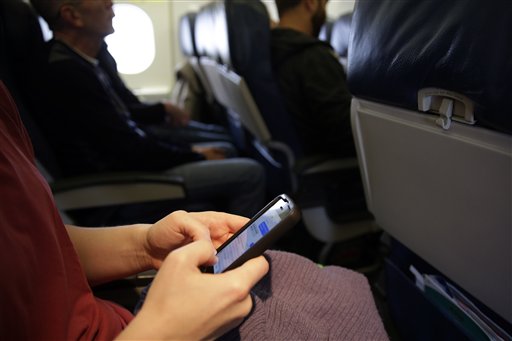FCC chief shares pain of own proposal to allow calls on planes
Published 4:56 am Tuesday, November 26, 2013

- In this October 2013 file photo, a passenger checks her cell phone before a flight in Boston. Federal regulators have said that rules against making cellphone calls during airline flights are "outdated," and it's time to change them.
The U.S. regulator proposing to end a ban on phone calls during commercial flights understands why some passengers say the change would take connectivity too far.
“I feel that way myself,” Federal Communications Commission Chairman Tom Wheeler said, after provoking complaints from flight attendants who want a peaceful cabin, fliers who don’t want chattering seatmates, and lawmakers who listen to both groups.
Wheeler’s statement was issued 25 hours after the agency announced his Nov. 21 plan to allow in-flight calls, unleashing a flood of protests. In that time, one FCC commissioner received more than 200 e-mails objecting to the move, an online petition at the White House surpassed 1,000 signatures, and members of Congress from both parties discussed blocking Wheeler’s proposal with legislation.
“Playing ‘Words with Friends’ is different than passengers having lengthy, loud ‘conversations with friends’ while in the tight, inescapable confines of an airline passenger cabin,” Sen. Ed Markey, D-Mass., said in an e-mailed statement Nov. 22.
It was a rude reception for one of the first proposals made by Wheeler, a former telecommunications industry lobbyist, since taking office as FCC chairman Nov. 4.
The agency has banned cellular phone use on planes since the 1990s. Wheeler said airlines outside the U.S. use mobile equipment without interfering with networks on the ground.
“Advances in technology likely no longer warrant, on a technological basis, the prohibition of in-flight phone use with the appropriate on-board equipment,” he said.
Wheeler said it would be up to airlines to decide whether to let their passengers make calls in mid-air.
“It will be only a technical advisory,” he said.
U.S. aviation authorities last month lifted restrictions on using electronic devices including Kindles from Amazon.com Inc. and iPads from Apple Inc. to read, browse the Web and send e- mail over Wi-Fi connections in airplane mode.
Airlines quickly applied to the Federal Aviation Administration to allow their passengers to stay connected throughout flights.
Voice calls were another matter. Delta Air Lines, United Continental Holdings and US Airways Group told Gogo, the largest provider of in-flight Wi-Fi service, to block voice calls over Internet streams to avoid annoying passengers.
Wheeler’s proposal faces an initial vote at a Dec. 12 FCC meeting in Washington. It would be then subject to another vote following a public comment period before taking effect.
Rep. Thomas Petri, R-Wisc., said he’ll probably join Rep. Peter DeFazio, D-Ore., in introducing a version of a failed 2008 bill they titled the HANGUP Act, for Halting Airplane Noise to Give Us Peace. The measure died amid opposition from the wireless industry, DeFazio said.
“There’s no need for voice when you’re trapped eight inches from a person,” DeFazio said in an interview.
“I’m puzzled,” he said. “It looks to me as if perhaps the new chair of the FCC is uninformed, or perhaps wants to deliver something the cellphone carriers have been lobbying for.”
Petri said in an interview that, like many lawmakers, he flies often and prefers the quiet.
“It’s bad enough when you’re taxiing in and out, and you’re next to one of those persons,” he said.
CTIA-The Wireless Association had no comment on Wheeler’s proposal, Jot Carpenter, vice president-government affairs, said in an interview. Members of the Washington-based trade group include the top four U.S. wireless carriers: Verizon Wireless, AT&T, Sprint and T-Mobile US.
CTIA opposed the HANGUP Act because blocking voice calls “ought to be a business decision made by an airline and its wireless partners, not by the government,” Carpenter said.
The Association of Flight Attendants objects to the FCC’s proposed change, Corey Caldwell, a spokeswoman for the union, said in an interview. The group in a news release said it wants a calm cabin environment without conversations that could drown out safety briefings and messages.
“We will be mobilizing around this,” said Caldwell, whose union led pressure that forced the Transportation Security Administration to back off its plan to allow small knives on planes.
Carriers including Delta and AMR Corp.’s American Airlines said customers like things as they are.
“Delta has years of customer feedback,” Paul Skrbec, a Delta spokesman, said in an e-mail. “The overwhelming sentiment is to continue with a policy that would not allow voice communications while in flight.”
American’s customers “are supportive of the current FCC policy of no cellphone usage in-flight,” Andrea Huguely, a spokeswoman, said in an e-mail.
At United Continental’s United Airlines, “customers have expressed concern about how the use of cellphones inflight will impact their experience onboard,” Luke Punzenberger, a spokesman, said in an interview.
JetBlue Airways Corp. collected feedback that “indicates people may not want the current FCC policy to change,” Sharon Jones, a spokeswoman, said in an e-mail. “If the FCC’s new policy does go into effect, we would prioritize making the cabin comfortable and welcoming for all – for those who want cell service and for those who like peace and quiet.”
The episode caught the attention of Representative Greg Walden, an Oregon Republican and chairman of a House subcommittee that oversees the FCC.
“Like most Americans, when I heard the news that the FCC was considering allowing cellphone calls on commercial flights, I was concerned to say the least,” Walden said.
“This will surely be a spirited topic of discussion” the next time FCC commissioners are summoned to appear before the subcommittee, Walden said in a Nov. 22 e-mail.




